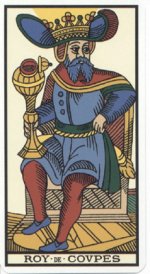jmd
In another thread, I note that this King appears to be wearing head-gear reminiscent of far-eastern Sino-Mongolian habit. It is also interesting that a number of early Marseille decks seem to depict this King with a slight Asian look about him - not only in crown, not only in attire, but even in facial depiction.
This King speaks to me at times of that which is brought from the East (the symbolic east): the rising Sun, as well as the gifts of spirituality that have long been claimed for the 'East' (from a mediæval European perspective - even if from my current location it is both to the West and North).
Here, the King may very well indicate that it is about time that the person determines and decides what they are to give themselve over to - whether cause, study, endeavour, or other over-arching important element.
More 'traditionally' I also at times see this king as alerting that decisions need to be made, and that one's feelings on the situation needs to be able to come to the fore: this is perhaps not a time for meticulous and detailed thinking, but for what feels correct or right.
Attached are the Dodal, Hadar and the Conver.
This King speaks to me at times of that which is brought from the East (the symbolic east): the rising Sun, as well as the gifts of spirituality that have long been claimed for the 'East' (from a mediæval European perspective - even if from my current location it is both to the West and North).
Here, the King may very well indicate that it is about time that the person determines and decides what they are to give themselve over to - whether cause, study, endeavour, or other over-arching important element.
More 'traditionally' I also at times see this king as alerting that decisions need to be made, and that one's feelings on the situation needs to be able to come to the fore: this is perhaps not a time for meticulous and detailed thinking, but for what feels correct or right.
Attached are the Dodal, Hadar and the Conver.




